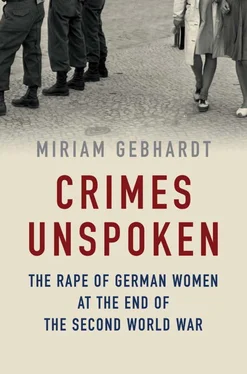Konrad Jarausch, Die Umkehr: Deutsche Wandlungen 1945–1995 (Munich 2004), p. 141.
Jennifer V. Evans, ‘Protection from the Protector, Court-Martial Cases and the Lawlessness of Occupation in American-Controlled Berlin’, in: Maulucci and Junker, GIs in Germany , pp. 212–33, here p. 233.
See Sybille Steinbacher, Wie der Sex nach Deutschland kam: Der Kampf um Sittlichkeit und Anstand in der frühen Bundesrepublik (Munich 2011), pp. 21–134; Eva-Maria Silies, Liebe, Lust und Last: Die Pille als weibliche Generationserfahrung in der Bundesrepublik 1960–1980 (Göttingen 2010), pp. 37–61.
See Höhn, GIs and Fräuleins , pp. 153–4.
See Jens Hacke, Philosophie der Bürgerlichkeit: Die liberalkonservative Gründung der Bundesrepublik (Göttingen 2006), pp. 14–15, 36. On the desire for inner stability, see also Ulrich Herbert, ‘Liberalisierung als Lernprozess: Die Bundesrepublik in der deutschen Geschichte – eine Skizze’, in: Herbert (ed.), Wandlungsprozesse in Westdeutschland: Belastung, Integration, Liberalisierung 1945–1980 (Göttingen 2003), pp. 7–49.
Pfister, Das Ende des Zweiten Weltkriegs , pp. 602–3.
Expositus Georg Pfister on 19 July 1945 in Pfister, Das Ende des Zweiten Weltkriegs , p. 465.
See Elizabeth Heineman, ‘The Hour of the Woman: Memories of Germany’s “Crisis Years” and West German National Identity’, in: The American Historical Review , 101, 2 (April 1966), pp. 354–95.
Quoted in Eva Gehltomholt and Sabine Hering, Das verwahrloste Kind: Diagnostik and Fürsorge in der Jugendhilfe zwischen Kriegsende und Reform (1945–1965) (Opladen 2005), pp. 174–5.
‘Die Bedeutung der Kriegs- und Nachkriegszeit für die Entwicklung des Kindes, Referat von Werner Villinger (Marburg/L.)’, in: Monatsschrift für Kinderheilkunde 103, 2 (January 1955), Verhandlung der 54. Ordentlichen Versammlung der Deutschen Gesellschaft für Kinderheilkunde in Essen 1954, pp. 65–72.
Gehltomholt and Hering, Das verwahrloste Kind , p. 123.
Ibid., p. 41.
Staatsarchiv München RA 77674.
Ibid.
Staatsarchiv München, LRA Traunstein, Kriminalpolizei, Sicherheitszustand im Land Bayern, Lagebericht für November 1946.
Kreiegsende und Neubeginn im Landkreis Eichsfeld 1945/46: Eine zeitgenössische Documentation – im Auftrag des Landkreises Eichsfeld, der Stadt Heilbad Heiligenstadt und des Bischöflichen Geistlichen Kommissariates Heiligenstadt (Eichsfeld 2003), p. 210.
Landesarchiv Berlin, DQ/1/1027.
Bundesarchiv Lichterfeld DQ1 No. 1610, Bekämpfung von Geschlechtskrankheiten.
Elizabeth D. Heineman, What Difference Does A Husband Make? Women and Marital Status in Nazi and Postwar Germany (Berkeley 1999), p. 102.
Bundesarchiv Lichterfeld DQ1 No. 1610.
Goedde, GIs and Germans , p. 92.
Bundesarchiv Lichterfeld DQ1 No. 1610.
Bundesarchiv Lichterfeld DQ1 No. 16, Zur Mitarbeit der Ärzteschaft im Kampf gegen die Geschlechtskrankheiten by Dr. Teller, 7 September 1946.
Stefan Grüner, ‘Nachkriegszeit 1945–1957: Alltag, Besatzung, politischer und wirtschaftlicher Neuaufbau’, in: Volker Dotterweich and Karl Filser (eds.), Landsberg in der Zeitgeschichte, Zeitgeschichte in Landsberg (Munich 2010), pp. 351–400.
Landesarchiv Berlin, Ministerium des Innern, Bestand Nr. 9, Der Polizeipräsident in Berlin, Ereignismeldungen – Meldungen an die Präsidialabteilung über wichtige Ereignisse aus den Inspektionsbereichen, 9/0284 an den Polizeipräsidenten von Berlin.
Else Baumann-Meyer, ‘Manches vergisst man eben nie’ – Aus dem Leben einer Arbeiterin (Oldenburg 2000), pp. 53–6.
In the Soviet occupied zone, there were not only medical and ethical indications but also social ones. For the health authorities, the social situation of the pregnant woman was the determining factor in their decision whether to approve an abortion; see Silke Satjukov, ‘“Besatzungskinder”: Nachkommen deutscher Frauen und alliierter Soldaten seit 1945’, in: Geschichte und Gesellschaft 37 (2011), pp. 1–33, here p. 6.
Jacobs, Freiwild , pp. 72–4.
See Kirsten Poutrous, ‘Von den Massenvergewaltigungen zum Mutterschutzgesetz: Abtreibungspolitik und Abtreibungspraxis in Ostdeutschland, 1945–1950’, in Richard Bessel and Ralph Jessen (eds.), Die Grenzen der Diktatur: Staat und Gesellschaft in der DDR (Göttingen 1996), pp. 170–98.
Grossmann, A Question of Silence , pp. 44–5.
See Poutrous, ‘Von den Massenvergewaltigungen zum Mutterschutzgesetz’.
Ibid.
My research also disagrees in this regard with Satjukow, ‘Besatzungskinder’, in terms both of numbers and of the frequency of abortions and institutionalization.
Karl-Heinz Mehlan, Die Problematik der Schwangerschaftsunterbrechung auf Grund der sozialen Indikation (Berlin 1956), pp. 131–2. For the legal situation in the Soviet occupied zone and in East Germany, see Poutrous, ‘Von den Massenvergewaltigungen zum Mutterschutzgesetz’.
Fritz Naton, ‘Schwangerschaftsunterbrechung nach Sittlichkeitsverbrechen’, diss., Ludwig Maximilian University of Munich, 5 April 1952.
Satjukow, ‘Besatzungskinder’, p. 6.
State Health Department of Garmisch-Partenkirchen on 6 December 1945 to Military Government, BayHStA5086a, Bavarian State Ministry of the Interior regarding pregnancy termination, abortion, premature births and miscarriages.
Hauptstaatsarchiv Stuttgart OMGUS 12/27–1–9/5, internal memo of 6 April 1946, quoted in Satjukow, ‘Besatzungskinder’, p. 6.
K. S. to Military Government in Munich on 18 September 1946, BayHStA 5086a.
Medical Council of Bavaria to Bavarian Ministry of the Interior on 18 October 1945, BayHStA 5086a, Bavarian State Ministry of the Interior regarding pregnancy termination, abortion, premature births and miscarriages.
Ibid., I. O. to American Military Government on 1 October 1945.
Ibid., letter of 17 December 1946.
Ibid., Bavarian Ministry of Justice on 19 December 1946 to the Public Prosecutors in Munich, Nuremberg and Bamberg.
Letter from a doctor to the head of the State Health Department of 22 January 1948.
Читать дальше











